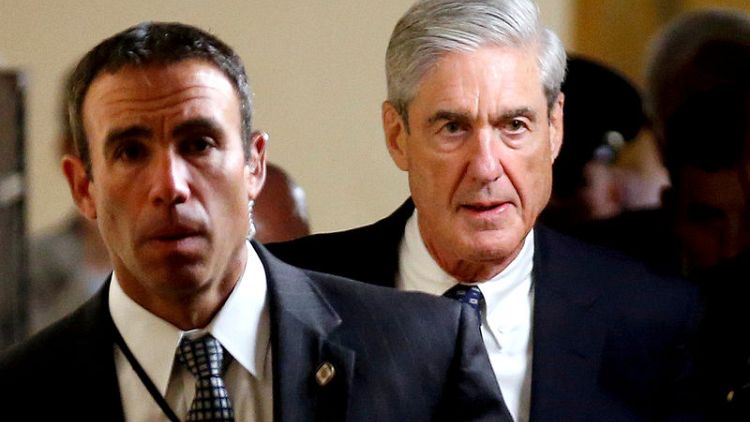By Sarah N. Lynch
WASHINGTON (Reuters) - Special Counsel Robert Mueller has handed in a keenly awaited report on his investigation into Russia's role in the 2016 presidential election and any potential wrongdoing by U.S. President Donald Trump, the Justice Department said on Friday.
Mueller submitted the report to Attorney General William Barr, the top U.S. law enforcement official, the department said. The report was not immediately made public - Barr will have to decide how much to disclose - and it was not known if Mueller found criminal conduct by Trump or his campaign, beyond the charges already brought against several aides.
Mueller, a former FBI director, had been examining since 2017 whether Trump's campaign conspired with Moscow to try to influence the election and whether the Republican president later unlawfully tried to obstruct his investigation.
Trump has denied collusion and obstruction. Russia has denied election interference.
In a letter to lawmakers, Barr said Mueller had concluded the probe, that he is reviewing the report and will be consulting the deputy attorney general and Mueller to determine what information from it can be released to Congress.
Barr, a Trump appointee confirmed by the Senate in February, told the lawmakers he may be able to provide information to Congress on the report's findings as soon as this weekend. He offered no details of Mueller's findings.
"The next steps are up to Attorney General Barr, and we look forward to the process taking its course. The White House has not received or been briefed on the Special Counsel's report," White House spokeswoman Sarah Sanders said.
Under the regulations governing special counsel investigations, the attorney general must share an outline of Mueller's report with Democratic and Republican leaders of the judiciary committees in Congress but it is largely up to him what to make public.
SHADOW OVER TRUMP
The Russia investigation has cast a shadow over Trump's presidency and ensnared key figures including his former campaign chairman Paul Manafort, former personal lawyer Michael Cohen and national security adviser Michael Flynn, who already have either been convicted or pleaded guilty to charges brought by Mueller. The big question now is whether the report contains allegations of wrongdoing by Trump himself.
Trump has sought to discredit the investigation, calling it a "witch hunt" and accusing Mueller of conflicts of interest. On
U.S. intelligence agencies have concluded that Moscow meddled in the election with a campaign of email hacking and online propaganda aimed at sowing discord in the United States, hurting Democratic candidate Hillary Clinton and helping Trump.
Mueller's investigators have looked into a large number of contacts between people associated with Trump's campaign and Russia such as a meeting in New York's Trump Tower between members of the president's inner circle including his eldest son and a Kremlin-linked Russian lawyer five months before the election.
Mueller sought to determine whether the campaign coordinated with Moscow, though it was not immediately clear whether the special counsel found evidence of a conspiracy.
Mueller also examined whether Trump committed obstruction of justice by trying to hinder the investigation, looking into acts such as urging FBI Director James Comey to drop a probe of Flynn's contacts with Russia, the subsequent firing of Comey, his attacks on the special counsel, dangling of pardons for former aides and the ouster of former Attorney General Jeff Sessions.
Mueller has brought charges against 34 people, including Russian intelligence officers, and three Russian companies, including one described as a "troll farm."
Regardless of whether the report is released, Mueller's team already has signaled the direction of the investigation through indictments and hundreds of related court filings that have offered extensive details about Russian interference in the election.
Trump fired Flynn in February 2017 after it emerged that he had misled Vice President Mike Pence and the FBI about his dealings with the then-Russian ambassador to the United States, Sergey Kislyak. In May 2017, he ousted Comey, whose agency had been leading the Russia investigation. Comey's firing led the Justice Department's No. 2 official, Rod Rosenstein, to appoint Mueller to take over the probe.
Congressional Democrats, who took over control of the U.S. House of Representatives in January, have said they plan to push for a release of the full Mueller report and said they would subpoena it and file suit if necessary.
A small number of House Democrats have pushed for Congress to impeach Trump and remove him from office but the party's leadership including House Speaker Nancy Pelosi has urged caution. No president has every been removed from office via impeachment.
Several House committees in the meantime are conducting aggressive investigations of Trump and people around him.
The last president to be impeached by the House, Democrat Bill Clinton, was acquitted by the Senate in 1999 on charges of perjury and obstruction of justice, meaning he was not removed from office.
In prosecuting Manafort, Mueller showed how the former campaign chairman made millions of dollars working for pro-Russian politicians in Ukraine, while also exposing his ties to a consultant who the special counsel said was connected to Russian intelligence. Manafort in the two cases prosecuted by Mueller's team was sentenced to 7-1/2 years in prison.
The special counsel's case against Cohen revealed that Trump was negotiating to build a skyscraper in Moscow late into the 2016 campaign, contradicting statements from Trump at the time that he had nothing to do with the Russians.
The special counsel also indicted longtime Trump adviser Roger Stone, a Republican operative and a self-proclaimed political "dirty trickster." Stone is accused of telling members of Trump's campaign that he knew in advance of plans by the WikiLeaks website to release emails damaging to Clinton that were stolen by Russia.
(Writing by Alistair Bell; Editing by Will Dunham)
